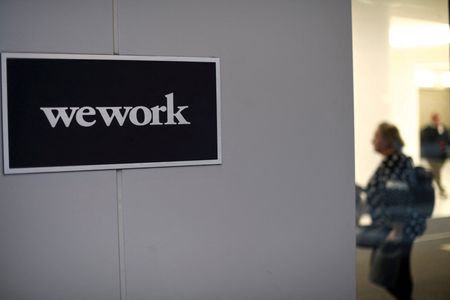By Dietrich Knauth
NEW YORK (Reuters) -WeWork has resolved landlords’ objections to its bankruptcy financing agreement, saying on Monday that it had agreed to reserve a portion of any future loans in an account that will be used for rent payments.
U.S. Bankruptcy Judge John Sherwood, who is overseeing the SoftBank backed company’s Chapter 11 proceedings, approved the compromise during a court hearing in Newark, New Jersey. The deal allows SoftBank to redirect up to $682.5 million into new credit facilities used to backstop the shared office space provider’s rent obligations.
SoftBank had already posted the funds as collateral for WeWork’s rent costs, but the redirected funds will give SoftBank more flexibility to extend and replace expiring credit agreements, avoiding a scenario in which landlords attempt to collect on the posted collateral.
WeWork is not borrowing any new money as part of the approved financing, the company’s attorney Ciara Foster said in court. But if it does bring in new money, through a future loan or asset sale, some of the future funds would be reserved to pay landlords, Foster said.
Sherwood thanked WeWork and its landlords for reaching an agreement that was “good for the case,” while acknowledging that WeWork’s landlords still face significant financial risk.
“The landlords are a huge player in this,” Sherwood said. “Some will do well and some might not.”
Some of WeWork’s landlords had objected last week, saying that the new financing agreements should not grant additional “perks” to SoftBank for money it had already posted as collateral. The landlords had argued that the new agreements would give SoftBank millions in additional lending fees and expenses, as well as new rights to be repaid first from certain assets like WeWork’s litigation claims.
Douglas Rosner, an attorney representing a group of 18 landlords affiliated with Beacon Capital Partners LLC, Boston Properties, and other backers, said that WeWork and SoftBank had revised the financing agreement to address landlords’ concerns.
With the dispute on financing resolved, WeWork must now provide more information to landlords about its future business plans, so that landlords can decide whether WeWork’s desired rent concessions are “an investment worth making,” Rosner said.
WeWork has said it will seek to negotiate rent costs down in its bankruptcy, and it will cancel leases from landlords unwilling to make concessions. WeWork has already canceled about 70 leases since filing for bankruptcy, and it will seek court permission to cancel additional leases in the coming weeks, attorney Steven Serajeddini said Monday.
A WeWork spokesperson said Monday that a consensual resolution on the company’s bankruptcy financing was “an important step forward” in the company’s Chapter 11 restructuring, reflecting continued support from the company’s lenders and key financial partners.
WeWork, once valued at $47 billion, expanded at breakneck speed but racked up steep losses before filing for bankruptcy protection on November 7.
The company, which filed for Chapter 11 with about $18.66 billion in liabilities, struggled to achieve profitability as a rise in work-from-home trends following the pandemic soured demand for its shared office spaces.
(Reporting by Dietrich Knauth, Editing by Nick Zieminski and Stephen Coates)






